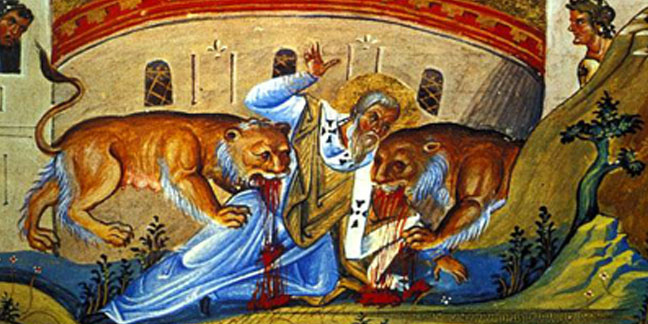Born around the year 50 in Syria, Ignatius was an Apostolic Father of the Church, a disciple, with St. Polycarp, of St. John the Evangelist, and the third bishop of Antioch, the former See of Peter before he went to Rome.
In 117 he was sentenced to death by the Emperor Trajan and arrested in Antioch. He was brought, on a slow journey that lasted months, to the circus in Rome to be devoured by lions. The Roman emperor hoped to make an example of Ignatius and discourage the spread of Christianity.
During his months of captivity he wrote seven letters to Christian congregations in the Mediterranean, who he referred to generally as the "Catholic" (universal) Church – thus coining the term for the first time. His letters included ones to the Ephesians, Magnesians, Trallians, Philadelphians, Smyrneans and Romans, as well as a letter to Polycarp, who was bishop of Smyrna and a disciple of St. John the Evangelist.
These letters proved to be influential in the development of Christian theology, since there are few extant writings from this period of Church history. They bear signs of being written in great haste and without a proper plan, such as run-on sentences and an unsystematic succession of thought. Ignatius is the first known Christian writer to put great stress on loyalty to a single bishop in each city, who is assisted by both presbyters (priests) and deacons. Earlier writings only mention either bishops or presbyters, and give the impression that there was usually more than one bishop per congregation. Ignatius also stresses the value of the Eucharist, calling it "a medicine to immortality."
His letters show him to have been a zealous bishop, with a fierce love for his flock and the universal Church, and he had no fear of martyrdom; rather, he welcomed it. His letter to the Romans is a jewel of Christian literature:
"I am writing to all the churches to let it be known that I will gladly die for God if only you do not stand in my way. I plead with you: show me no untimely kindness. Let me be food for the wild beasts, for they are my way to God. I am God's wheat and bread. Pray to Christ for me that the animals will be the means of making me a sacrificial victim for God.
"The prince of this world is determined to lay hold of me and to undermine my will which is intent on God. Let none of you here help him; instead show yourselves on my side, which is also God's side.
"Believe instead what I am now writing to you. For though I am alive as I write to you, still my real desire is to die. My love of this life has been crucified, and there is no yearning in me for any earthly thing.
"Rather within me is the living water which says deep inside me: 'Come to the Father.' I no longer take pleasure in perishable food or in the delights of this world. I want only God's bread, which is the flesh of Jesus Christ, formed from the seed of David, and for drink I crave His blood, which is love that cannot perish.
"Pray for me that I may obtain my desire. I have not written to you as a mere man would, but as one who knows the mind of God."
— Catholic News Agency
'No earthly pleasures, no kingdoms of this world can benefit me in any way. I prefer death in Christ Jesus to power over the farthest limits of the earth. He who died in place of us is the one object of my quest. He who rose for our sakes is my one desire.' — St. Ignatius of Antioch



